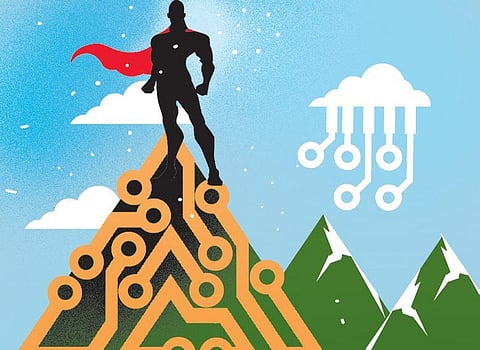VUCA—The Future of Work
VUCA is society-defining. For the uninitiated, VUCA is Volatility, Uncertainty, Complexity, and Ambiguity. Not change, this is about the acceleration of change. We can already relate to this, in the just-here-future in the health domain. Powered by AI and automation, we are globally experiencing significantly higher levels of wellness, a tenfold increase in the productivity of doctors, nurses and medical infrastructure. Taking the guesswork out of medicine and surgery at a fraction of current costs, these changes will disrupt “work” in this sector.
Our world is plateauing on literacy, knowledge access is universal, epic demographic shifts and relentless digitalisation are upon us. As impermanence grips commerce models, we will see exponential numbers of business births and deaths, an end of lifelong employment, and the emergence of a gigantic gig workforce.
The straws in the wind are unmistakable—the Fourth Industrial Revolution will require the reskilling of a billion jobs in the next 10 years; 40 percent of core skills will undergo redefinition and many millions of jobs will be displaced. Robots, automation, ‘thinking’ machines and AI are the harbingers of massive job disruption. Across sectors, machines are chewing up not just low-skill repetitive jobs, they are even eliminating complex tasks of precision, from medicine and surgery to stock-trading and banking, R&D etc—all very high-level problem-solving and decision-making skills.
These work gobblers have shown they can do better than humans across both blue-collar and white-collar roles. Admittedly, (we hope!) they can never replace living, breathing, thinking humans in the workplace, but a tremendous amount of work will get “squeezed out” of the existing workflows. Physical work is not going to evaporate, but the basics of a lot of manual work will be taken over by machines. Instead of muscles, fingertip operations will be the norm.
The platform economy is upon us, and the development of new nonstandard work formats will change the very basic concept of work and employment. This will mean far more flexible work, gig work, freelancing, accompanied by a rise of individual worker brands, enabling easy display of past work quality on social media, thus transacting work and commerce with respect.
This technology-driven business disruption will also reformat the traditional employer-employee relationship. Secure monthly paychecks will be taken over by contractual engagements. The massive reduction in employee numbers will mean that work will happen remotely by agile disaggregated teams. These megatrends also foretell an implosion, and replacement of the existing education and training structure for delivering human capacity and capability-building. Lastly, more than ever, it now becomes an individual’s responsibility to make himself “employable”.
Capitalism anyway has been seeking to reinvent itself for a while now, but we now see significant differentiation emerge in business DNAs. Dramatically, new innovators are racing to create radically new digital business models, and often end up writing the rule book itself. Then there are true-blue capitalist corporates where sheer size and influence determine the best moat around the castle. These will obviously seek to grow in a manner to exert even more power—and whose employees only exist to further corporate goals.
Going further, there are the ‘green’ companies, where corporate responsibility is not merely nice-to-have but is a business imperative—the make-good-do-good world. The purpose is paramount. These spaces are marked by social conscience, environmental responsibility, and a focus on diversity and human rights. Employees staffing these are wired uniquely, and have a lot of influence in these organisations.
Add to this bewildering variety of business DNAs and the role genetics needed, a generous double dollop of technology disruption, and you have the makings of a seriously complex matrix of what will constitute our world, and what skills might be needed to make an impact.
It’s not difficult to imagine the shift in the kind of skills that will be needed for work of the future. On a mass scale, digital skills will be paramount, layered with financial, communication and collaboration skills, all part of how our work-world would be strung together. Since gig workers will abound, add personal marketing skills to the pot. At a generic level, lifelong apprenticeship, unlearning and relearning will be critical skills, but paramount will be emotional and spiritual resilience to be able to navigate an ever-changing mosaic. Managing their own VUCA, all beating unbeaten paths in the dense foliage of work.
Now for some glad tidings. While all these seem like daunting challenges to meet, what is undeniable is the steep evolution that our society is going through. When Maslow pictured his hierarchy of human needs model 80-odd years ago, he certainly could not have imagined that his pyramid would become more of a cylinder, where billions had osmotically taken the high road towards self-actualisation.
Rohtash Mal
Ex-corporate honcho and organisational yoda; now entrepreneur and stargazer
rohtash.mal@gmail.com

